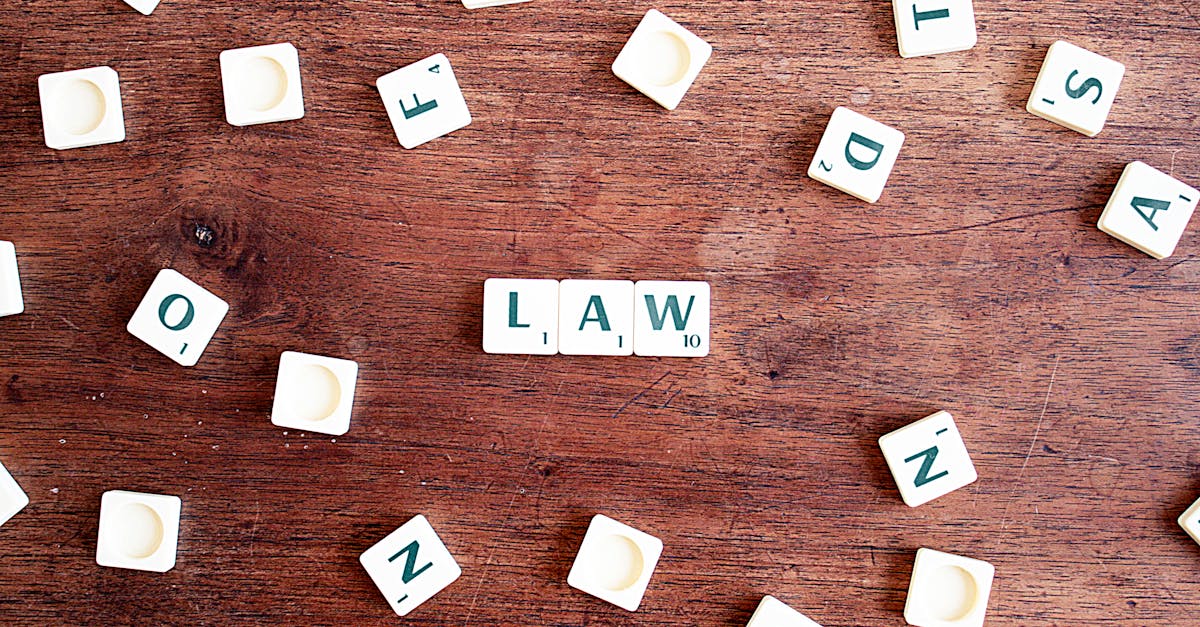Can I draft my own legal documents?

The Importance of Legal Review
Drafting legal documents requires meticulous attention to detail. While it may be tempting to solely rely on your own expertise, seeking legal review is a crucial step in ensuring the accuracy and effectiveness of your documents. Mistakes or oversights in legal language can have significant consequences, potentially leading to misunderstandings, disputes, or even legal challenges.
Legal review provides an added layer of protection by having a trained legal professional analyze your documents. They can identify any ambiguous terms, inconsistencies, or legal issues that you may have overlooked. This process can help you mitigate risks, safeguard your interests, and enhance the overall quality and enforceability of your self-drafted documents.
Proofreading for Accuracy
Proofreading plays a crucial role in ensuring the accuracy and reliability of self-drafted legal documents. It is imperative to meticulously review the content to identify and rectify any potential errors or inconsistencies that could impact the document's validity. As drafting legal documents demands precision and attention to detail, proofreading serves as a safeguard against inadvertent mistakes that could have legal repercussions for the involved parties.
A comprehensive proofreading process entails scrutinizing the document for grammatical errors, typographical mistakes, and inconsistencies in formatting. Additionally, attention should be paid to verifying the accuracy of legal terminology, ensuring that the language used is clear and unambiguous. By diligently proofreading self-drafted documents, individuals can enhance the document's credibility and reliability, thereby mitigating the risk of misunderstandings or disputes arising from ambiguities or inaccuracies in the content.
Safeguarding Your Interests in SelfDrafted Documents
Drafting legal documents without adequate knowledge or experience can potentially expose individuals to legal risks and unintended consequences. To safeguard your interests in self-drafted documents, it is crucial to pay meticulous attention to detail and ensure that all necessary clauses and provisions are correctly included. Failing to include essential elements could result in issues down the line, such as disputes or unenforceability of certain terms.
Moreover, when drafting legal documents, it is imperative to consider the possibility of future changes in circumstances. Anticipating potential shifts and including provisions that allow for amendments can help in adapting the document to changing needs without requiring a complete overhaul. By carefully safeguarding your interests in self-drafted documents and incorporating flexibility for future adjustments, you can mitigate the risks associated with DIY legal work.
Including Necessary Clauses and Provisions
When drafting legal documents, including necessary clauses and provisions is crucial to ensure that all pertinent details are correctly outlined in the document. Each clause and provision serves a specific purpose in a legal document, whether it is to define the rights and obligations of the parties involved, establish the jurisdiction of the agreement, or set forth the consequences of a breach. Omitting essential clauses can leave room for misinterpretation or legal challenges in the future, underscoring the significance of diligently identifying and incorporating all required elements.
Moreover, by meticulously including all necessary clauses and provisions in self-drafted legal documents, individuals can help safeguard their interests and protect themselves from potential disputes or misunderstandings. The specificity and clarity of the terms within a legal document play a pivotal role in avoiding ambiguity and preventing future conflicts. As such, adhering to a comprehensive checklist of essential clauses and provisions can fortify the document's enforceability and validity, providing a solid legal foundation for all parties involved.
Revising and Updating SelfDrafted Documents
Revising and updating self-drafted documents is a critical step in the process of ensuring that your legal paperwork remains current and accurate. As circumstances change or new laws come into effect, it is crucial to review and revise your documents to reflect these developments. By regularly revisiting your self-drafted documents, you can address any outdated information and make necessary adjustments to protect your interests.
Drafting legal documents is not a one-time task; it requires ongoing attention and maintenance. As you revise your self-drafted documents, pay close attention to any changes in your personal situation or relevant laws that may impact the validity or effectiveness of your paperwork. By staying proactive and responsive to evolving circumstances, you can ensure that your legal documents continue to serve their intended purpose and safeguard your interests effectively.
Adapting to Changing Circumstances
Adapting to changing circumstances is a crucial aspect of drafting legal documents on your own. As time progresses, laws may change, parties involved may have different needs, or unexpected situations may arise. Therefore, it is essential to regularly review and update your self-drafted documents to ensure that they remain relevant and enforceable. Failure to adapt to these changes could result in legal complications or disputes down the road.
When revising self-drafted documents, pay close attention to any modifications needed to address new circumstances or requirements. This may involve adding, modifying, or removing clauses to accurately reflect the current situation. By staying proactive and vigilant in revising your legal documents, you can safeguard your interests and maintain compliance with applicable laws and regulations. Remember, the adaptability of your drafted documents is key to their continued effectiveness and relevance.
FAQS
Can I draft my own legal documents?
Yes, you can draft your own legal documents, but it is recommended to seek legal review to ensure accuracy and completeness.
Why is legal review important for self-drafted documents?
Legal review is important to ensure that your self-drafted documents are legally binding, free from errors, and protect your interests.
How can I proofread my self-drafted legal documents for accuracy?
Proofreading involves carefully reviewing the document for spelling, grammar, and factual errors, as well as ensuring that all legal terms are used correctly.
What should I do to safeguard my interests in self-drafted documents?
To safeguard your interests, include necessary clauses and provisions that address your specific needs and protect you in case of disputes or legal issues.
Is it important to revise and update self-drafted legal documents?
Yes, it is essential to regularly revise and update your self-drafted legal documents to ensure they reflect any changes in laws, regulations, or your personal circumstances.